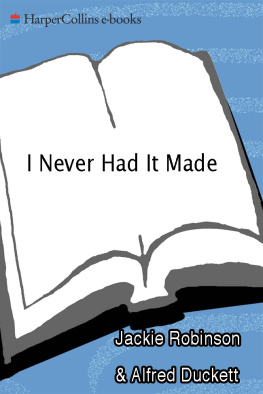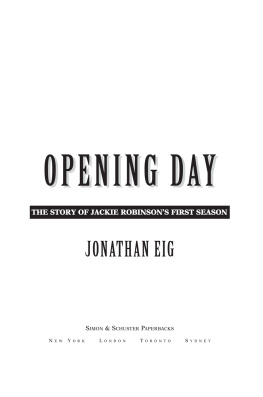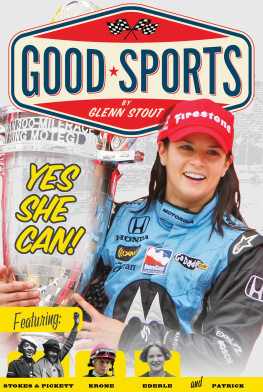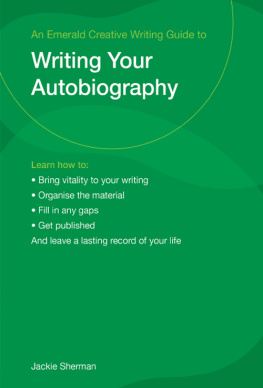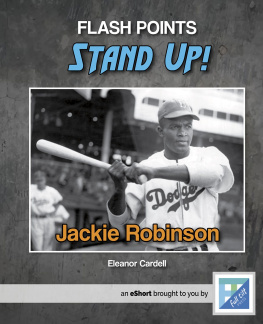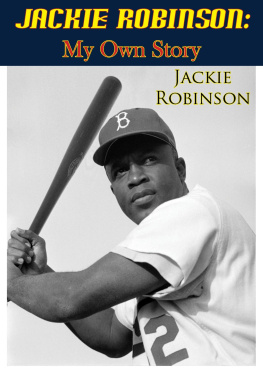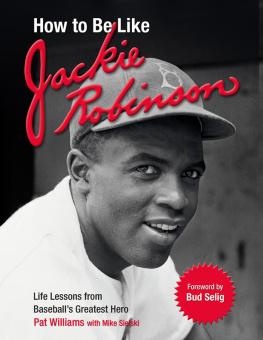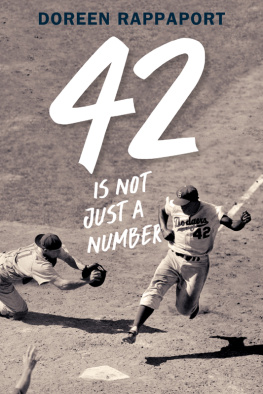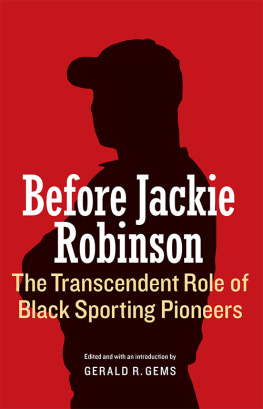Robinson Jackie - I never had it made: an autobiography
Here you can read online Robinson Jackie - I never had it made: an autobiography full text of the book (entire story) in english for free. Download pdf and epub, get meaning, cover and reviews about this ebook. City: Hopewell;N.J, year: 1995;2013, publisher: HarperCollins Publisher;Ecco Press, genre: Non-fiction. Description of the work, (preface) as well as reviews are available. Best literature library LitArk.com created for fans of good reading and offers a wide selection of genres:
Romance novel
Science fiction
Adventure
Detective
Science
History
Home and family
Prose
Art
Politics
Computer
Non-fiction
Religion
Business
Children
Humor
Choose a favorite category and find really read worthwhile books. Enjoy immersion in the world of imagination, feel the emotions of the characters or learn something new for yourself, make an fascinating discovery.
- Book:I never had it made: an autobiography
- Author:
- Publisher:HarperCollins Publisher;Ecco Press
- Genre:
- Year:1995;2013
- City:Hopewell;N.J
- Rating:3 / 5
- Favourites:Add to favourites
- Your mark:
- 60
- 1
- 2
- 3
- 4
- 5
I never had it made: an autobiography: summary, description and annotation
We offer to read an annotation, description, summary or preface (depends on what the author of the book "I never had it made: an autobiography" wrote himself). If you haven't found the necessary information about the book — write in the comments, we will try to find it.
I never had it made: an autobiography — read online for free the complete book (whole text) full work
Below is the text of the book, divided by pages. System saving the place of the last page read, allows you to conveniently read the book "I never had it made: an autobiography" online for free, without having to search again every time where you left off. Put a bookmark, and you can go to the page where you finished reading at any time.
Font size:
Interval:
Bookmark:


T o my wife, Rachel,
to my children Sharon and David,
and to the memory of Jackie, Jr.
Contents
Cornel West
T hree fundamental events between March and June of 1947 in America changed the course of world history in the twentieth century. On March 12, 1947, President Harry Truman proclaimed in a historic speech before a special joint session of Congress the intention of the U.S. government to support free peoples who are resisting subjugation by armed minorities or by outside pressures. This, the famous Truman Doctrine, was declared in response to both the beginning of the collapse of the most powerful empire the world has ever seen (the British Empire) and the emergence of one of the most repressive, the Soviet Empire. In short, Truman announced the aim of the American Empire to police the world in the light of its democratic ideals and imperial interests.
On April 15, 1947, before 26,623 Americans (more than half of them black) at Ebbets Field in Brooklyn, Jackie Robinson became the first African-American to play professional, major league baseball. In this historic opening game against the Boston Braves, a dignified and heroic descendant of American slaves and sharecroppers who wore number 42 on his Dodger uniform played first base in one of the sacred spaces of American culture. More even than either Abraham Lincoln and the Civil War, or Martin Luther King, Jr. and the Civil Rights movement, Jackie Robinson graphically symbolized and personified the challenge to the vicious legacy and ideology of white supremacy in American history.
Soon afterward, on June 5, 1947, Secretary of State George C. Marshall delivered an address at Harvard Universitys graduation ceremonies, in which he put forward an American plan for European economic recovery with huge U.S. assistance in order to combat Soviet domination. The basic requirements of the Marshall Plan were U.S. influence over the internal budgets of the European recipient states and the disproportionate purchase of American exports for European recovery.
These three events represent the most fundamental processes of this centurythe end of the Age of Europe (and the preeminence of its last great empire), the acceleration of the challenge to white supremacy (a pillar of European imperialism and American history), and the move of the American Empire to the center of the world-historical stage (in opposition to the Soviet Empire). In this way, a historic presidential speech, an unforgettable baseball game, and an influential commencement address take us to the very heart of the agony and anguish, the achievements and accomplishments, of our time.
With the surprising collapse of the Soviet Empire in 1989, the Truman Doctrine has run its course. And with the economic recovery of Europealongside the phenomenal growth of the U.S. economybetween 1947 and 1973, the Marshall Plan did what it set out to do. Despite the significant gains of the Civil Rights movement in the 1960s, the challenge to white supremacy in America remains incomplete, unfinished. That is why, today, the life and work, the achievements and suffering, of Jackie Robinson continue to speak to us with such power and poignancy.
In 1947, Jackie Robinson not only symbolized all of black America on trial in the eyes of white America and the expansion of the ideals of democracy, he also represented the best of a traditional black quest for dignity, excellence, and integrity. This quest was primarily a moral effort to preserve black sanity and spirituality in the face of white-supremacist barbarity and bestiality; it was a human attempt to hold on to dreams deferred and hopes dashed, owing mainly to slavery and Jim Crow in America. The deep and devastating effects of psychic scars, physical abuse, and material deprivation could not suffocate the black tradition of moral struggle and political resistance. When Jackie Robinson states that he never had it made, he means, in part, that he had to fight in a variety of ways and on a number of fronts to preserve both his sense of dignity and his integrity; and in part that he was able to fight primarily because of the love and support of those fighters who came before him and those who now stood by his side.
The most striking features of this marvelous book are its honesty, its courage, and its wisdom. Here is a great American hero who refuses to be a mythical hero. Instead, he tells the painful truth about himself as a human beingsomeone who, like all of us, needs love, struggles with insecurity, makes mistakes, revels in achievements, and weeps in sorrow. Here is a transracial figure beloved by blacks and whites who rails against the absurdities of white racism and the seductive security of black xenophobia. Here is a celebrity who takes us on a journey through the valleys and over the mountaintops of intimate relations with his family, friends, and mentors. Here is one of the greatest athletes of our century disclosing his developing sense of political engagement and community empowerment as a liberal Republican in a right-wing Republican party. Here is a black man and fatherwith a strong sense of his masculinitywho talks about his maturity in terms of lessons painfully learned from his loving mother, his brilliant and self-confident wife, his adventurous children, and his supportive father figures. I revelled in his exchangescritical and respectfulwith Malcolm X, Martin Luther King, Jr., Richard Nixon, William Buckley, Black Panther leaders, and Lewis Micheaux.
Jackie Robinsons life and book constitute an antiphonal song of a great composite democratic individual. This grand phrase of Walt Whitman captures the jazz-like character of Jackie Robinsonhis noble experiment in which restraint and performance, improvisation, and discipline under severe pressure are exercised with excellence; his openness to others; his generosity to others, and his relentless self-criticism without recourse to self-pity and self-indulgence. And yet, his disillusionment with America is real. Robinson cannot stand and sing the national anthem or salute the flag. His deep patriotism and his hatred of white supremacy will not allow him to engage in such empty gestures of country-worship. He knows that money is Americas God and that he is a black man in a white world.
Jackie Robinsons historic challenge to white supremacy in America was not an attempt to prove himself and his humanity to white America. Rather, it was to be himself, to allow his God-given humanity to be seen, acknowledged, and recognized by those who questioned it. He gained respect because he so deeply respected himself, because he respected black people and others. He willingly took on the awesome burden of symbolizing black humanity in the one arena of fairness in a country predicated, in part, on unfairness to black people. And he bore this burden with great dignitynot because he wanted to be somebody but, rather, because he was already a great somebody to be in a land where all black folk were nobody to most white people. This is why his grand example is, in the moving and wise words of George Will (with whom I rarely agree!), One of the great achievements not only in the annals of sports, but of the human drama anywhere, anytime. This book reveals why and how Jackie Robinsons life was an exemplary testimony of the black and human Love Supremethe same moral and spiritual ideal toward which Martin Luther King, Jr., Fannie Lou Hamer, and John Coltrane asked us to aspire.
Harvard University
1995
Hank Aaron
T he first time I saw Jackie Robinson, he was playing baseball in Mobile, Alabama. He was touring at that time with the Brooklyn Dodgers. They had a farm team in Mobile, and they used to pass through. I just happened to be in the crowd; I was fourteen, maybe fifteen. I had had a vision, a vision that if things worked out, I probably would get to the big leagues before Jackie retired. As it turned out, I did get there. I played against him for three or four years before he retired.
Font size:
Interval:
Bookmark:
Similar books «I never had it made: an autobiography»
Look at similar books to I never had it made: an autobiography. We have selected literature similar in name and meaning in the hope of providing readers with more options to find new, interesting, not yet read works.
Discussion, reviews of the book I never had it made: an autobiography and just readers' own opinions. Leave your comments, write what you think about the work, its meaning or the main characters. Specify what exactly you liked and what you didn't like, and why you think so.

